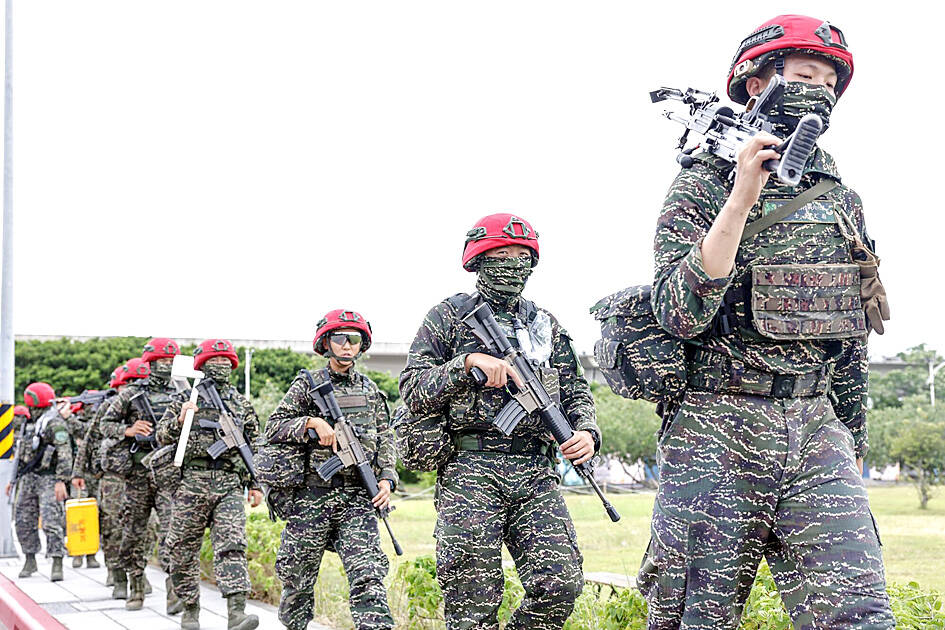The armed forces have 155,218 volunteers in active service, the fewest professional soldiers in the military in the past five years, a report published earlier this month by the Legislative Yuan’s Budget Center showed.
Although the military has received the final deliveries related to multiple arms deals, the weapons systems would likely not prove effective if the nation lacks the necessary number of highly trained soldiers to operate them, the center report said.
The Ministry of National Defense listed a NT$220.5 billion (US$6.85 billion) budget for next year, which represents a 7.67 percent increase in spending over the current year, the report said.

Photo: I-hwa Cheng, Bloomberg
Military investments related to arms procurements are to increase 34.65 percent and would become the fastest-growing spending item in the budget, it said.
Volunteer service members are the backbone of the military’s combat strength, and staffing requirements for professional soldiers are not alleviated by extending the length of the conscription period, it said.
The center said the strength of the volunteer forces peaked in 2021 before declining annually, while many principal combat units designated as Class 1 are below 80 percent of their authorized strength.
The military had 162,039 volunteers in 2019, 164,063 volunteers in 2020, 164,884 volunteers in 2021 and 159,392 volunteers last year, it said.
The dearth of personnel is likely to impede the armed forces’ ability to train and retain soldiers with the skills necessary to operate advanced military equipment, it said.
The program to recruit prospective soldiers and officers through reserve cadet programs embedded in high schools, vocational colleges and universities has not achieved the desired effect, the center said.
Although the Ministry of National Defense has established reserve cadet programs in 410 high schools and vocational high schools since 2018, the number of enlistments from the cadet programs at all levels of schools has fallen every year since 2020, it said.
These programs reported 9,616 enlistments in 2020, 8,293 in 2021 and 7,409 last year, it said.
The drop in enlistments occurred despite the ministry’s steady funding of the programs, which increased to NT$39.89 million last year from NT$14.43 million in 2019, the center said.

INVESTIGATION: The case is the latest instance of a DPP figure being implicated in an espionage network accused of allegedly leaking information to Chinese intelligence Democratic Progressive Party (DPP) member Ho Jen-chieh (何仁傑) was detained and held incommunicado yesterday on suspicion of spying for China during his tenure as assistant to then-minister of foreign affairs Joseph Wu (吳釗燮). The Taipei District Prosecutors’ Office said Ho was implicated during its investigation into alleged spying activities by former Presidential Office consultant Wu Shang-yu (吳尚雨). Prosecutors said there is reason to believe Ho breached the National Security Act (國家安全法) by leaking classified Ministry of Foreign Affairs information to Chinese intelligence. Following interrogation, prosecutors petitioned the Taipei District Court to detain Ho, citing concerns over potential collusion or tampering of evidence. The

Seventy percent of middle and elementary schools now conduct English classes entirely in English, the Ministry of Education said, as it encourages schools nationwide to adopt this practice Minister of Education (MOE) Cheng Ying-yao (鄭英耀) is scheduled to present a report on the government’s bilingual education policy to the Legislative Yuan’s Education and Culture Committee today. The report would outline strategies aimed at expanding access to education, reducing regional disparities and improving talent cultivation. Implementation of bilingual education policies has varied across local governments, occasionally drawing public criticism. For example, some schools have required teachers of non-English subjects to pass English proficiency

‘FORM OF PROTEST’: The German Institute Taipei said it was ‘shocked’ to see Nazi symbolism used in connection with political aims as it condemned the incident Sung Chien-liang (宋建樑), who led efforts to recall Democratic Progressive Party (DPP) Legislator Lee Kun-cheng (李坤城), was released on bail of NT$80,000 yesterday amid an outcry over a Nazi armband he wore to questioning the night before. Sung arrived at the New Taipei City District Prosecutors’ Office for questioning in a recall petition forgery case on Tuesday night wearing a red armband bearing a swastika, carrying a copy of Adolf Hitler’s Mein Kampf and giving a Nazi salute. Sung left the building at 1:15am without the armband and apparently covering the book with a coat. This is a serious international scandal and Chinese

TRADE: The premier pledged safeguards on ‘Made in Taiwan’ labeling, anti-dumping measures and stricter export controls to strengthen its position in trade talks Products labeled “made in Taiwan” must be genuinely made in Taiwan, Premier Cho Jung-tai (卓榮泰) said yesterday, vowing to enforce strict safeguards against “origin laundering” and initiate anti-dumping investigations to prevent China dumping its products in Taiwan. Cho made the remarks in a discussion session with representatives from industries in Kaohsiung. In response to the US government’s recent announcement of “reciprocal” tariffs on its trading partners, President William Lai (賴清德) and Cho last week began a series of consultations with industry leaders nationwide to gather feedback and address concerns. Taiwanese and US officials held a videoconference on Friday evening to discuss the